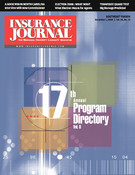It’s a select community: only 11 state insurance commissioners are elected rather than appointed. Wayne Goodwin is now one of the 11. He won the Nov. 4 election to be North Carolina’s regulator, succeeding Jim Long, who first won the job in 1984 and kept getting re-elected.
In an interview with Insurance Journal (see page 112), Goodwin noted that elected commissioners tend to serve longer than appointed commissioners. No doubt Commissioner Long, who was first elected in 1984, skewed those statistics. To his credit, the long-serving public servant wasn’t forced out after 24 years; he decided on his own not to run for re-election.
Goodwin needs no introduction to the Tar Heel State nor do its residents need one to him. He is a graduate of University of North Carolina at Chapel Hill as well as the UNC School of law. He practiced law for 13 years before being elected to the state House of Representatives in 1996 where he served for eight years. In 2004 he lost a race for labor commissioner but that same year, his wife, Melanie, was elected to succeed him in the House. She still serves in the position.
In early 2005, Long asked him to be his assistant commissioner of insurance. In that capacity he has also served as the assistant state fire marshal.
The fact that he had experience in the department was probably the key to his victory, Goodwin says.
Along with his legal, political and regulatory background, he brings a recognition of the value of independent agents. In fact, he is already setting up a series of regional advisory meetings across the state with agents.
He wants to find ways for the department to utilize new technology — vowing to update the Web site regularly and write his own department blog to keep people informed.
Even more important perhaps than his victory was his campaign. The race was a test of publicly financed campaigns authorized by the state Legislature. Goodwin was the first candidate to accept public financing; his Republican opponent followed suit.
Goodwin thinks the test was a success. In 2004, 66 percent of the funds raised by candidates for insurance commissioner were from entities regulated by the department. But in this election, that percentage plummeted to 5 percent.
It just seems right to limit the funds from special interests, whether insurers or trial lawyers, for this job. Freeing candidates from fundraising promises to put the focus on substance and qualifications over process and politics. It has the potential to lessen the power of incumbency and the corrosion of conflicts of interest. Now more than ever the job of state insurance commissioner requires knowledge, not connections and judgment, not favoritism. Perhaps the North Carolina experiment with public financing will become a model for other states where commissioners are elected, further advancing the goal of not more regulation but better regulation.
Meanwhile, congratulations are in order for Commissioner Goodwin not only for winning but also for the way he did it. He really is a member of a very select community now.
Topics Legislation North Carolina
Was this article valuable?
Here are more articles you may enjoy.


 Anthropic’s Claude Chatbot Goes Down for Thousands of Users
Anthropic’s Claude Chatbot Goes Down for Thousands of Users  Marsh Awarded Injunction Against Former Employees Now With Howden US
Marsh Awarded Injunction Against Former Employees Now With Howden US  Florida Appeals Court Pulls the Plug on Physician Dispensing in Workers’ Comp
Florida Appeals Court Pulls the Plug on Physician Dispensing in Workers’ Comp  Property, Auto Insurance Shopping Up as Consumers Feel Economic Pressures
Property, Auto Insurance Shopping Up as Consumers Feel Economic Pressures 


